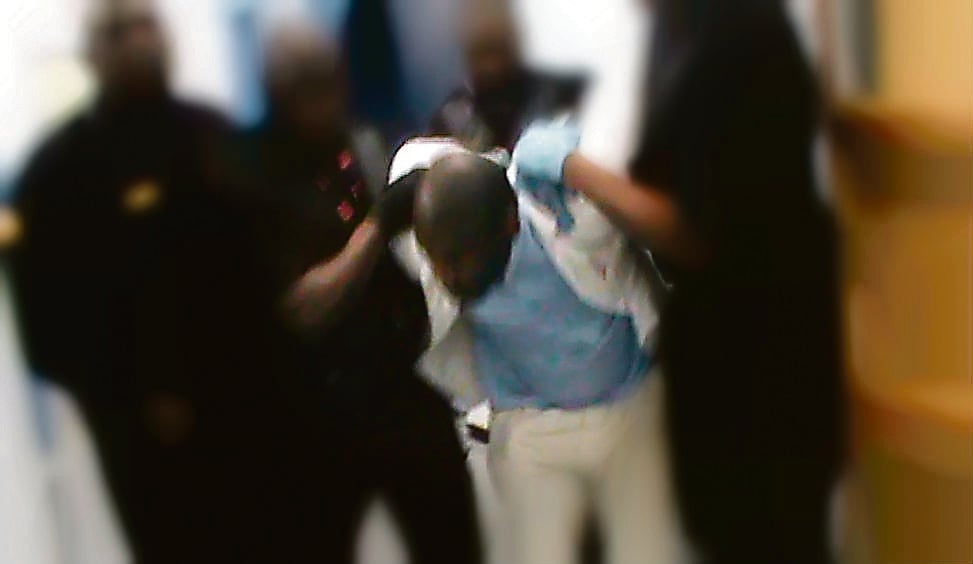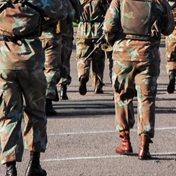
UK and US firms run prisons in South Africa and five former commissioners of correctional services are accused of corruption
If executives of other private companies operating in prisons had followed the lead of former Bosasa operations boss Angelo Agrizzi, there may well not be enough space in newspapers to cover the fallout.
Bosasa, now called African Global Operations, is not the only company to have profited from prison services.
UK security company G4S – one of the largest companies in the world – and the US GEO group, both run prisons in South Africa.
Together they imprison about 6 000 offenders.
The shareholders of the G4S prison, Bloemfontein Correctional Contracts (BCC), signed a 25-year deal in 2000 to build, run and maintain Mangaung prison.
G4S was awarded the subcontract to run the prison.
FROM STATE-OF-THE-ART FACILITY TO HELLHOLE AND BACK
When Mangaung prison opened in 2001, it was hailed as the Rolls-Royce of prisons; a top facility that offered extensive educational programmes to inmates and which was kitted out with the newest technology.
But, over the years, the G4S-run facility has been marred by irregularities and allegations of abuse and torture.
In 2012 while I was working for the Wits Justice Project I started investigating the prison.
Inmates told me stories about torture, electroshocks and forced medication with a substance that made them walk and talk like “zombies”.
In October 2013 matters came to a head when Mangaung prison was taken over by the correctional services department for 10 months.
G4S had failed to maintain order at the facility, inmates were rioting and the staff went on strike.
G4S responded by employing unqualified staff, which is unlawful.
Shortly after the department stepped in, the Mail
Sbu Ndebele, then correctional services minister, responded by saying that the “privatisation of prisons had failed”.
He set up a task team to investigate the allegations and said the report would be published in 30 days.
Department officials confirmed off the record that they collected evidence of abuse, assaults, suspicious deaths and forced medication with antipsychotic drugs.
But the department has still, almost six years after the investigation, refused to release the report.
Lawyers with the Centre for Applied Legal Studies are now in court, demanding the release of the report.
Department sources claim that a “bakkieful” of evidence relating to this investigation went “missing”.
PRIVATISATION
Prison privatisation provides dazzling opportunities to line pockets. And the explosive testimonies before the Zondo commission could help explain why a government department would obstruct the release of a report detailing misconduct by a private company.
In his testimony Agrizzi implicated five national commissioners of correctional services – Khulekani Sithole, Linda Mti, Nontsikelelo Jolingana, Tom Moyane and Zach Modise – in corruption.
The department official given the task of legal oversight over public/private prison contracts, Josiah Maako, received R15 000 a month, Agrizzi claimed.
ANC MP Vincent Smith, who vocally opposed prison privatisation in Parliament, allegedly received close to R700 000 in kickbacks from Bosasa.
Former deputy regional commissioner of the Free State, Grace Molatedi, received R150 000 in payments, Agrizzi alleged.
This cast of characters was also responsible for the legal oversight over the Bloemfontein G4S-run prison and compliance with its R10.6 billion contract.
When presented with evidence of abuse and irregularities, they did nothing.
The 2013 department investigation into Mangaung prison is not the only report swept under the carpet.
In 2008 a department controller stationed there, Tatolo Setlai, in a scathing report, compared Mangaung prison with Guantanamo Bay and mentioned the use of electroshocking and the unlawful isolation of inmates.
This report was sent to the then minister of correctional services, Nosiviwe Mapisa-Nqakula, and the then regional commissioner for the Free State, Zacharia Modise, whom Agrizzi testified received R1 million from Bosasa.
Mapisa-Nqakula and Modise both disregarded Setlai’s report.
Read: State capture commission investigators confirm Bosasa witnesses'testimony
“The report was submitted to the contract management section at head office for further investigation. It found the report by Setlai was one-sided and there was no substance to the allegations. No further investigation, and/or action, was deemed necessary,” said DCS’s Manelisi Wolela at the time.
Maako headed the contract management section.
ALLEGATIONS
Instead of addressing the serious allegations in Setlai’s report, the company and the department chose to punish him for whistle-blowing.
G4S reported him to the police and Modise reported him to the minister, whose investigation later cleared him. Modise transferred Setlai to the regional office.
Modise, a Bloemfontein resident whose son works for the prison, was appointed temporary head of the prison at the end of 2013. He was responsible for the investigation Ndebele commissioned.
One of the first actions he took was to reinstate three G4S officials who were suspended for shooting inmates with rubber bullets at close range; one of them was blinded in one eye.
In November 2013 Ndebele told Parliament he would meet the national commissioner and the prison’s shareholders to discuss the situation.
Prison sources said this meeting took place at former president Jacob Zuma’s Nkandla homestead.
Shortly thereafter, players were repositioned. Ndebele took up a position as high commissioner to Australia.
His successor, Michael Masutha, visited Mangaung prison shortly after his appointment.
He spoke about the prison in glowing terms, referring to it as a “state-of-the-art facility”. He did not mention the investigation report.
Modise, meanwhile, was appointed acting national commissioner in early 2014 and later national commissioner, a post he retired from in 2017.
Before he left, the standing committee on public accounts (Scopa) grilled him about his relations with private companies contracted to the department.
Scopa members told Modise the contracts were irregular and they had evidence that department officials colluded with the companies to formulate favourable contract terms.
Modise was openly accused of corruption and of misleading Parliament. Two weeks later Masutha announced Modise’s retirement.
THE BROTHERS MOKOENA
BCC consists of five shareholders each with a 20% stake in the lucrative contract. G4S is one of the shareholders as is Old Mutual.
The other three are empowerment companies Fikile Mangaung, Ten Alliance Mangaung and the Ikhwezi Community Trust.
The last three companies were registered with the Companies and Intellectual Properties Commission just months before the contract was signed and they share the same address as G4S’ headquarters in Centurion.
While Fikile has well-documented construction experience, Ten Alliance Mangaung and the Ikhwezi Community Trust have no clear corrections track record.
BCC is headed by two brothers: Pappie and Lebogang Mokoena. They have chaired the BCC, been directors of Ten Alliance and now Lebogang is also a director of Ikhwezi Community Trust.
Pappie was mayor of Mangaung municipality between 2000 and 2005. His political career ended when he was arrested, with his wife Granny, for corruption, but he was acquitted in 2012.
Lebogang is an influential businessman who holds positions in various investment, construction and trading companies.
The best known is Bidvest, on whose board he previously served alongside now President Cyril Ramaphosa.
THE JACOB ZUMA CONNECTION
G4S does not just run a prison, it claims to be South Africa’s biggest private employer, with about 15 000 people on its payroll. It offers services in protection, guarding and cash-in-transit.
Zuma was claimed to be a regular at G4S headquarters in Centurion. A source, who worked at the head office at the time, claimed he regularly saw Zuma appear after hours at Andy Baker’s office, the then Africa president of G4S.
A G4S spokesperson denied this, saying: “No, the former President has not visited any G4S office.”
Zuma’s close associates are also on the board of G4S SA.
Sandile Zungu is a board member and his company Zungu Investments has a 13% stake in the business. Zungu bankrolled Zuma’s presidential campaign.
G4S has also provided security for Gupta-owned mines, specifically Optimum Coal and Brakfontein mine.
A G4S spokesperson said the company has not provided security services at either Optimum or Brakfontein.
“G4S previously had a small number of contracts with the Gupta family to provide security officers at city locations totalling less than 40 officers. G4S no longer has any contracts with the Gupta family.”
Zungu responded saying: “I cannot remember president Zuma ever visiting G4S headquarters, let alone regularly. Zuma wouldn’t have had any ties with G4S.
“I do not do business with the Guptas.”
Zungu further said he was “not aware” of the torture allegations against the G4S prison in Bloemfontein.
In 2009, a parliamentary investigation revealed that high-ranking department officials owned shares in BCC, including then corrections commissioner Xoliswa Sibeko and the former judge-turned-businessperson Thabani Jali.
Jali chaired the commission on prison corruption in 2001/02.
Pappie Mokoena said he was not at liberty to disclose the shareholders’ identities, but said: “I can confirm that neither Xolisa Sibeko nor Thabani Jali ... nor any DCS officials, own shares in, or benefit in any way from BCC”.
He denied that the consortium was in court trying to stop the release of the DCS investigation report. He further insisted that BCC had no knowledge of the torture allegations at the prison.
G4S and its shareholders were never held accountable for the abuse that first came to light in 2013.
The company, which has consistently declined to comment on the allegations, said it was unable to do so last week because it wasn’t afforded enough time to do so.
The spokesperson added: “G4S has no reason to appear before the Zondo Commission, nor has the company been asked to participate”.
GCS spokesperson Singabakho Nxumalo said the department respects the mandate of the Zondo commission and will continue to cooperate with all law enforcement agencies.
As to why the department report on allegations of abuse at Mangaung prison had not been released, he said: “The matter is before court.”




 Publications
Publications
 Partners
Partners









